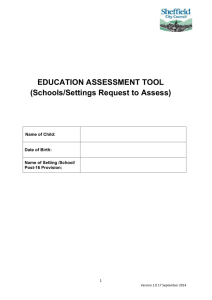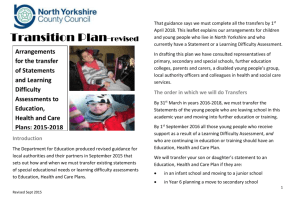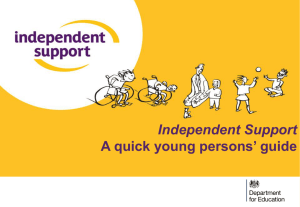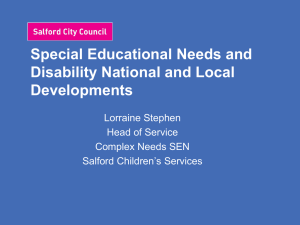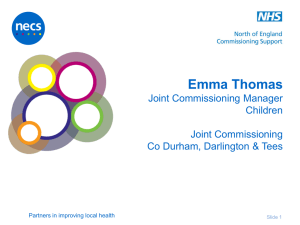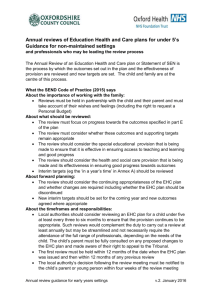Bath & North East Somerset - SEND reform * outline project plan
advertisement
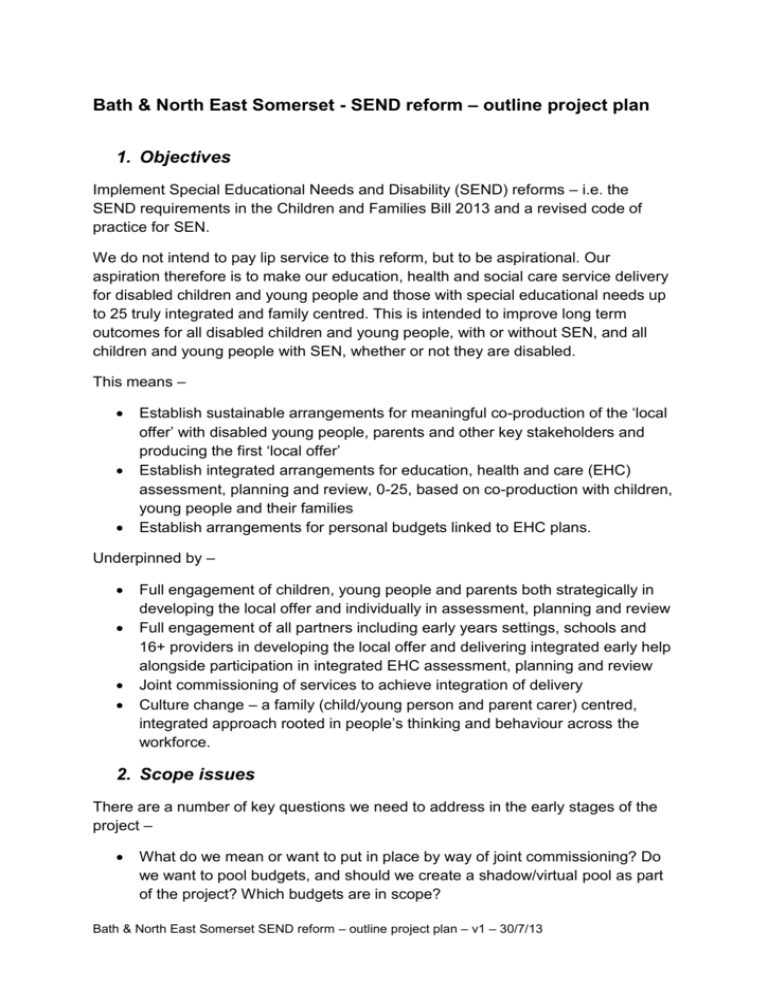
Bath & North East Somerset - SEND reform – outline project plan 1. Objectives Implement Special Educational Needs and Disability (SEND) reforms – i.e. the SEND requirements in the Children and Families Bill 2013 and a revised code of practice for SEN. We do not intend to pay lip service to this reform, but to be aspirational. Our aspiration therefore is to make our education, health and social care service delivery for disabled children and young people and those with special educational needs up to 25 truly integrated and family centred. This is intended to improve long term outcomes for all disabled children and young people, with or without SEN, and all children and young people with SEN, whether or not they are disabled. This means – Establish sustainable arrangements for meaningful co-production of the ‘local offer’ with disabled young people, parents and other key stakeholders and producing the first ‘local offer’ Establish integrated arrangements for education, health and care (EHC) assessment, planning and review, 0-25, based on co-production with children, young people and their families Establish arrangements for personal budgets linked to EHC plans. Underpinned by – Full engagement of children, young people and parents both strategically in developing the local offer and individually in assessment, planning and review Full engagement of all partners including early years settings, schools and 16+ providers in developing the local offer and delivering integrated early help alongside participation in integrated EHC assessment, planning and review Joint commissioning of services to achieve integration of delivery Culture change – a family (child/young person and parent carer) centred, integrated approach rooted in people’s thinking and behaviour across the workforce. 2. Scope issues There are a number of key questions we need to address in the early stages of the project – What do we mean or want to put in place by way of joint commissioning? Do we want to pool budgets, and should we create a shadow/virtual pool as part of the project? Which budgets are in scope? Bath & North East Somerset SEND reform – outline project plan – v1 – 30/7/13 How integrated do we want services to be – depth (more integrated working across separate services, co-location, fully integrated structures) and width (which services should be included)? And if we want greater integration when and how (does not have to be within this project timeframe and maybe much better if not – e.g. establish ‘shadow/virtual’ integration for now)? Do we want to introduce key-working for EHC assessment, planning and review and how (and if not, how do we propose to make this young person and parent carer centred)? How should we work with schools, settings and colleges to specify in more detail how needs will be assessed at the Additional SEN Support stage, and presumably this be through use of the CAF/existing integrated working processes? Do we want to provide personal budgets (PBs) more widely than just those with integrated EHC plans (NB health service implementing PB’s for some children April 2014)? Clarity that this project is simply about implementing the SEND reforms, it is not about making cuts to any budgets or reducing the number of children with integrated EHC plans compared to those eligible for statements now. Also that while the project may raise other issues, e.g. service integration, gaps or changes needed to services in the local offer, we need to be clear about whether such issues are ‘core’ to the project or not, and about their urgency if not. Clarity about the core objectives of the project which stem from the legislative changes and the desire to be aspirational in achieving them while not overreaching ourselves. We need to achieve clarity about integrated family centred working arrangements for children and young people with SEN or disabilities or both, and for those with SEN at all levels of need, within the framework set out nationally. The draft framework currently excludes those without SEN from the integrated education, health and care (EHC) plans proposed, and is relatively unclear about how the arrangements should work for those with SEN below the current threshold for a statement of SEN in the current framework. 3. Key risks This simply outlines some key risks that are obvious now - we will need to risk assess the project more thoroughly as part of detailed planning and keep risks under review in each workstream as well as across the project as a whole. Key elements in the Bill and/or the draft indicative code of practice may be radically changed and/or dropped at a late stage in our project. Lack of clarity in the draft framework about practice around additional SEN support (replaces current school action/school action plus) and exclusion of disabled young people without SEN from the proposed integrated plans – risk of weaker framework for these groups Bath & North East Somerset SEND reform – outline project plan – v1 – 30/7/13 Parents carers and/or young people may not trust the purpose of the reforms and meaningful engagement may be hard to achieve. Schools/early years settings/16+ providers may not fully buy in to what is needed/wanted in respect of Additional SEN Support. Other service developments, budget savings, changes to Council, Clinical Commissioning Group (CCG) or Sirona Health and Care may cut across, distract or reduce availability of necessary staff time and focus thus undermining this project. Loss of key personnel during the project. 4. Deliverables Sustainable process for initial development and future review of local offer. First local offer. Processes for delivering integrated EHC assessments, plans and reviews. Systems for integrated decision making and delivering personal budgets linked with integrated EHC plans. Training for EHC staff in particular, and more widely as needed in the new system, and to promote culture change and integrated family centred working. Wider communications, events, workshops, meetings etc to achieve engagement of all stakeholders as required. 5. Resources needed – finance and staff time Significant staff time will be needed to work on the main work streams. The local offer will require significant staff time. Development of webpages will require additional capacity. EHC assessment, planning and review will require staff time from across education, health, children’s and adults social care. Developing and piloting integrated assessment and planning, tracking children and young people’s information will require significant admin capacity. Joint commissioning and personal budgets will require staff time including key finance and commissioning/ contracts personnel as well as key managers/practitioners. Services will need to commit to staff attendance at training and other events. Finance will be required for venues, refreshments, materials including printing and other costs in delivering events, meetings etc. Finance may be required for changes to IT or other systems required to underpin the changes. Parent carers and young people will need us to meet the costs of their participation. Bath & North East Somerset SEND reform – outline project plan – v1 – 30/7/13 Engagement of young people in particular will require additional support if not fully achievable through existing young people’s participation infrastructure. 6. Project workstreams and timeline These are set out in separate documents – Outline workstreams and timeline Detailed description of workstreams. Overall the project is intended to deliver the required changes by September 2014, with a need for a review/consolidation stage to Dec 2014. Lead officer – Charlie Moat, Project Officer Service Improvement Signed off by the SEND reform steering group 30th July 2013 Bath & North East Somerset SEND reform – outline project plan – v1 – 30/7/13
